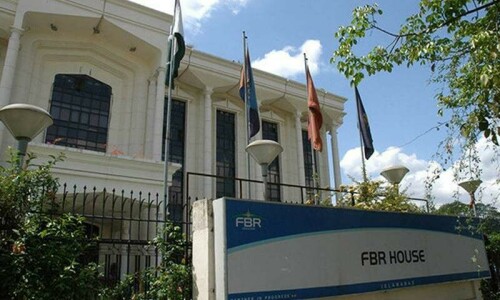• Traders’ associations estimate trade loss of Rs500bn
• Incessant rains, transport disruptions keep workers at home
KARACHI: The economy suffered substantial trade losses due to a countrywide strike called by the business community against high power bills and increasing tax burden on Wednesday, overshadowing claims of a major victory, while industrial activities exhibited a mixed trend due to various factors.
Industrialists’ bodies supported the strike by traders, while also urging the government to revise contracts with independent power producers (IPPs) without committing to keep their units closed.
One cannot rule out the impact of incessant rains and disrupted transportation in the port city, which forced many workers and staffers to stay at home.
Markazi Tanzeem-i-Tajiraan President Kashif Chaudhry estimated a daily trade loss of Rs500 billion on Wednesday, resulting from the disruption of transactions between various business factions.
He also claimed that most industrial hubs in various cities remained shut, even though industrial associations had fully supported the traders’ strike, but were not compelled to close their units, unlike shops and markets.
Secretary General/CEO of the Overseas Investors Chambers of Commerce and Industry M Abdul Aleem said: “As per our information, the traders’ strike had no impact on our members’ operations, although some areas may have been affected due to the rains.”
Pakistan Business Council CEO Ehsan Malik said the strike had minimal impact on the industry. Instead, it caused inconvenience primarily for lower-income daily shoppers. He said monthly shoppers’ purchasing cycles will continue until around the fifth of next month, making it unlikely that traders would risk losing business. Traders will suffer losses due to spoilage of perishable goods.
Mr Ehsan said shutter-down strikes are a test of the government’s resolve to bring traders into the tax net, emphasising the importance of maintaining its determination to broaden the tax base. He warned that if the government relaxes its stance, the industry will bear a greater burden of taxes.
North Karachi Association of Trade and Industry President Faisal Moiz Khan said that approximately 70 per cent of the 8,000 industrial units, ranging from small to large, remained closed, while 30pc of export-oriented units continued operations to meet export deadlines.
He estimated a production loss of Rs20 million on Wednesday, noting that the closure of industries affected local supply chains and disproportionately impacted daily wagers among the 300,000-strong workforce in the area.
F.B. Area Association of Trade and Industry President Syed Raza Hussain said that around 50-60pc of the 1,800 industrial units in the area remained closed, while export-oriented units continued operations. He added that industries in Karachi face numerous challenges, including discriminatory taxes and duties compared to other provinces, which may ultimately lead to their closure.
He said electricity prices have surged significantly in recent months, with consumers in Karachi being disproportionately charged a heavy fuel cost adjustment (FCA) compared to other cities.
Adding to the woes, water scarcity persists in various industrial zones, while the provincial government has introduced taxes on subsoil water, further increasing production costs, Mr Hussain said.
He warned that the current situation forces industrialists to either shut down, leave the country, or relocate to Punjab, adding that the government fails to recognise that small and medium-sized units.
Korangi Association of Trade and Industry President Johar Qandhari said production activities in 4,500 units were 30-35pc lower due to reduced worker attendance, caused by inadequate public transportation and rainfall, which also impacted export shipments.
Published in Dawn, August 29th, 2024















































Dear visitor, the comments section is undergoing an overhaul and will return soon.